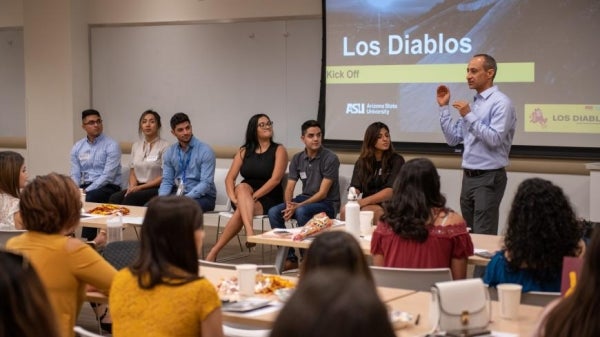College of Health Solutions grad and veteran doing it all for his family

College of Health Solutions graduate and Marine Corps veteran Clayton Alexander.
By Aidan Hansen
Editor’s note: This story is part of a series of profiles of notable spring 2024 graduates.
His wife and kids are his “why.”
Arizona native and former Marine Sgt. Clayton Alexander says family is why he is so committed to his degree program, career and everything else.
“I want to create a great environment for my kids to grow up, and I want to make sure I can say yes to things and that I can help them achieve their own goals in the future,” Alexander said.
Alexander is graduating from the College of Health Solutions with a bachelor's degree in sports science and performance programming.
Spending six and a half years in the Marine Corps, Alexander experienced muscle tears and a crush injury to his right leg. When he recovered and eventually exited the military, he noticed many others suffering from muscular and skeletal injuries as well as chronic conditions and thought about how he could help.
After learning his wife was pregnant with their second child, Alexander transferred from Texas Tech to ASU to pursue his passion for becoming a strength and conditioning coach while also helping his wife through physical therapy school.
“It's great wanting to help other people and ultimately that is essentially what I want to do is help other people live long happy lives with a good quality, but I want to do that for my family first,” Alexander said.
Question: What was your “aha” moment when you realized you wanted to study the field you majored in?
Answer: I thought, what if instead of getting people after they've been hurt, let’s prevent them from getting hurt. That expanded into doing that for all high-output occupations like fire, EMS, first responders and military populations.
Q: Why did you choose ASU?
A: Originally, it was because of Dr. Rachel Larson. I looked at her CV and it was pretty impressive. And then after meeting Joe Marsit, I liked the professors I'm going to have to experience in the actual program at the school, and it ended up solidifying it.
Q: What’s something you learned while at ASU — in the classroom or otherwise — that surprised you or changed your perspective?
A: I'm old. Nothing will make you realize age faster than being 30 in a class with people who are, like, 22.
Q: Which professor taught you the most important lesson while at ASU?
A: It's hard to think of just one. Joe Marsit is a well of information that is just never ending. I think one of the biggest lessons I've learned from him is that you have to be able to know how far to push yourself and how far you can push other people. And the better part of it is knowing when you're reaching that limit, and figuring out how to create a cohesive environment.
Q: What was your favorite spot on campus, whether for studying, meeting friends or just thinking about life?
A: I spend most of my time in this (Sun Devil Fitness Center). The second floor, where it's at, I spend most of my time now, when I'm there pretty much either outside of Joe's office.
Q: What’s the best piece of advice you’d give to those still in school?
A: I do a lot of working backward. So I think what would help people the most for any degree program in life, in general, probably is figuring out where you want to go. What's the end goal?
Q: What are your plans after graduation?
A: I want to be a strength coach. Hopefully, I can get in somewhere where I can help one of these higher-demand populations. Hopefully, I get a job helping these people and giving them the knowledge base that they need to where they understand how they can still maintain their health with their occupation.
Q: If someone gave you $40 million to solve one problem on our planet, what would you tackle?
A: It would probably be revamping agriculture and allowing them to create better, more high-nutrient-dense food because we have different food than most of the rest of the world.
More University news

ASU Alumni Association to honor 3 outstanding alumni leaders during Homecoming
The Arizona State University Alumni Association will proudly recognize three innovative alumni leaders during the Homecoming Parade and football game against Brigham Young University on Saturday, Nov…

From service to civilian success
Transitioning from military to civilian life is a unique experience that can be challenging for veterans. Some struggle to find their purpose, while others seek a network of people and resources to…

ASU as the 'New American University' sets the model for higher education reform
Arizona State University’s charter is only 46 words long, but it’s a bold promise that’s a model for the reinvention of higher education.The document, formally introduced by ASU President Michael…